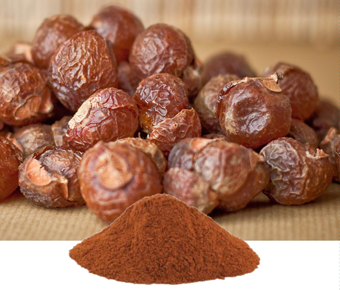Sapindus Mokorossi Extract

Botanical Name : Sapindus Mokorossi Extract
Common Name : Areetha, soap-nut Extract
Assay : 20%- 40% Saponnins by Gravimetry
Applications : Hair Protective Agents
Product Usage : Natural Detergent
Description :
A species of tree in the Sapindaceae family is called Sapindus mukorossi. Common names for the fruit include Indian soapberry, washnut, and soap nut. This is a native of Goa and Western Coastal Maharashtra in India. Sapindus mukorrossi, also known as the areetha, ritha, or reetha tree in India and Nepal, is a deciduous tree that can be found growing up to 4000 feet in elevation in the lower foothills and midhills of the Himalayas, including the Shivalik hills. The soap nut tree can be planted close to farmers' residences and is tolerant of somewhat poor soil. The Ritha fruit can be employed in an increased oil recovery method, according to research.
Studies have revealed that soapnut extracts can be utilized as an organic surfactant to improve the mobility of oil from the fields. Additionally, studies have shown that the soapnut has the potential to be employed as a natural surfactant to remove arsenic from soils that are abundant in iron. Shampoos and cleansers made using Ayurvedic ingredients frequently contain areetha, or soap nut tree fruit. They are used in Ayurvedic medicine to treat eczema, psoriasis, nausea, and to aid in the discharge of mucus from the lungs. Since they have mild insecticidal qualities, soapnuts have long been used to get rid of head lice.
The soapnut contains the compound of saponin, which has natural cleansing properties, and therefore the soapnut can be used as a cleanser for hair, skin, and clothing. These saponins are also useful as insecticides, for purposes such as removing head lice off the scalp. Scientific study have suggested that the soapnut can also be used as a natural remedy for many health problems, such as for treating migrane headaches, or for dermatological purposes such as using the seeds to remove skin impurities like pimples or eczema. Many research studies have been conducted to prove the plant’s potential as being spermicidal, contraceptive, hepatoprotective, emetic, anti-inflammatory and anti-protozoal.

